Study identifies genes that cause periodontal disease
Scott Froum, DDS, editorial director of Perio-Implant Advisory, says, “This research is a terrific step forward in identifying potential genes that can influence the onset and progression of periodontal disease. Because the etiology of periodontal disease is multifactorial and very dependent on the genetic makeup of the individual, any advancement in the field of personalized dental medicine represents major potential therapeutic benefits.”
Columbia’s cross-sectional study used 313 gingival tissue samples from 120 patients with periodontitis. (1) Both healthy and diseased tissue were examined. (1) The team identified many of the genes “implicated in immune and inflammatory pathways, confirming laboratory and clinical observations of the development of periodontal disease.” (2)
The technique called genome-wide reverse engineering allowed the isolation of genes that may distinguish between primary and secondary causes. As such, focus can now begin on creating treatments that will halt periodontal disease at its source.
To read more about periodontal disease, visit the Perio-Implant Advisory website.
References
1. Sawle AD, Kebschull M, Demmer RT, Papapanou PN. Identification of master regulator genes in human periodontitis. J Dent Res. 2016;95(9):1010-1017. doi: 10.1177/0022034516653588.
2. Gum disease genes identified by researchers. ScienceDaily. https://www.sciencedaily.com/releases/2016/10/161004103649.htm. Published October 4, 2016. Accessed October 12, 2016.
